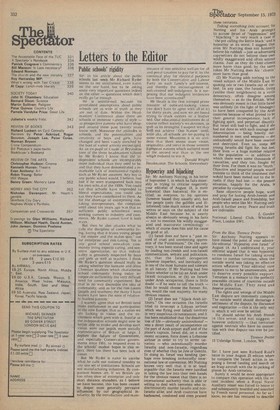Public schools' rigidity
Sir: In his article about the public schools last week Mr Richard Ryder seems to me uninformed, even naïve, on the one hand, but to be asking some very important questions indeed on the other — questions which don't really go far enough.
He is uninformed because his generalised assumptions about public schools are as wide of truth as they are out of date. Within the Headmasters' Conference alone there are schools of immense variety of style — as prospective parents who have shopped around these past twenty years know well. Moreover the attitudes in schools, and the potentialities and creativity of boys and girls, have changed and been vastly enriched bV the host of varied activity encouraged. As an ex-pupil of Coade at Bryanston (one of the three headmasters saluted by Mr Ryder) I know that the in dependent schools are incomparably more individual than they used to be. and that they have demonstrated a remarkable lack of institutional rigidity such as Mr Ryder assumes. Any boy in any public school would. I believe. feel lost if he were transported back into his own SCht.:41 01' the 1930s, You could say that schoOls have responded to liberal expectations; you could also say they have contributed to them. As for the shortage of enterprising risktaking entrepreneurs, the complaint until about ten years ago was that insufficient public schoolboys were seeking careers in industry and commerce. Mr Ryder cannot have it both ways.
But then he also attacks what he calls the discipline of community living, saying that it trains young people " for empire and the status quo," not for enterprise and risk-taking. Yet in any good school nowadays community living expects caring, and sensitive appreciation, so that individuality is genuinely respected by boys and girls as well as teachers. I think Mr Ryder's question should really be asking whether the humane and often Christian qualities which characterise school community living today incorporate sufficiently the very difficult need for community experiment. But that in no way discredits the idea of community, and as for the risk-takers (pupils and teachers) the many I have known have been the sons of relatively fearless parents.
warmly agree that we British need more enthusiasm in our participation in the new Europe, that as a nation we are lacking in vision and the excitement which goes with it. Insofar as the independent schools might now be better able to evoke and develop such vision were our pupils more socially representative of Britain at large, I deplore the failure of Government, and especially Conservative governments since 1951, to respond even to the schools' modest hopes in this repeel Here too there has been lack of vision.
But Mr Ryder is naïve to ascribe what he calls our national timidity to any one set of institutions. Schools are not manufacturing industries. By comparison homes are. If we British are too often slow of enterprise and only short distance =seders, as I believe we have become, this has been caused by deeper more generally pervasive influences: by our geographical insularity; by the introduction and main
tenance of non-selective welfare for all and penal taxation to pay l'or it; by the continual play for electoral purposes by both the Conservative and Labour Party on each family's self-interest. and thereby the encouragement of soft-centred self-indulgence. Is it surprising that our indulgent tendencies have been accentuated?
Mr Heath is the first intrepid prime minister of' outward-looking vision (we don't have to agree with all of it) l'or thirty years, and now we are found trying to crack oysters on a leather bed. Our educational institutions do of course reflect society's weaknesses, as syell as its strengths. I suspect we may ivetl not achieve ' One Nation ' until, inter alia, ill schools are lee-paying to some extent. Meantime it is no accident that there seems more vision, originality, and verve in those western Etiropean nations which suffered most hi the second war than in the one wheel endured to win it. Donald Wright Headmaster. The Schools, Shrewsbury
































 Previous page
Previous page